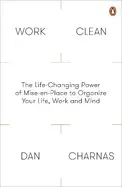
Everything in Its Place (Work Clean) - by Dan Charnas
ISBN: 1623365929Date read: 2022-10-08
How strongly I recommend it: 5/10
(See my list of 430+ books, for more.)
Go to the Amazon page for details and reviews.
Mise-in-place. Chefs spend more time planning than actually cooking. The success of the kitchen depends on its processes. Apply this to your work.
my notes
Chef means “boss.”
In French, “chef” is the equivalent of the English word chief.
In English, the term chef became aligned with the culinary world as a shortened form of the French title chef de cuisine, chief of the kitchen.
“Restaurant” literal meaning: place of restoration, so named for the restorative soups (restaurants) that several of these early establishments sold.
Strongly hold on to your regimen of good habits in a world that will tempt you to ditch them without any immediate consequence.
Mise-en-place central values: preparation, process, and presence.
Do all you can to set yourself up for success.
Good process not only makes the work better but also makes you better.
Refine good process: how can you do this better, or easier, or with less waste?
The night before, do anything you need to do so you can start the next day centered and ready.
Chefs become planning machines so they can become cooking machines.
It takes longer to plan and prepare than it does to cook.
Make lists, not only of the things you know you need to do, but everything you might need to do.
For your most important categories of tasks, log your times for a month, and see if they average out.
How many small tasks, like returning e-mails, can you complete in an hour, on average?
Determine the length of a “minimum session” to write an article.
Take 30 minutes to clean your physical and virtual spaces, clear your mind, and plot your day.
Schedule your actions.
There is no difference between a task and an appointment.
They both need your time and your presence.
This difference has long been maintained by the two different tools we use for each: the “to-do” list and the calendar. But it is a false difference.
The “to-do” list without appointments lures us into packing lots of tasks onto it without thinking about when they will actually get done.
A calendar with only appointments on it misleads us into thinking we have an open schedule when in fact we don’t.
Get everywhere fifteen minutes early.
Getting there early applies especially to the appointments you make with yourself because those are the appointments you are least likely to keep - having no one to answer to but yourself.
Make the kitchen and the spaces within it as small as possible, so that you don’t have to take a step.
The cleaner her station, the faster she worked.
Working clean: keeping that system of organization no matter how fast and furious the work is.
An action taken now has immeasurably more impact than a step taken later because the reactions to that action have more time to perpetuate.